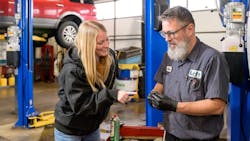Cathy Heying saw the effect transportation scarcity had on poverty firsthand. As a social worker who was also a ministry volunteer, she witnessed repeated encounters where having basic transportation would directly affect the person’s quality of life and upward mobility. “A running car could help them get out of the shelter and into a job,” Heying recalls.
Seeing how the stress of unreliable or nonexistent transportation had on the people she served, Heying decided to do something about it—she pursued a career change into automotive repair.
After graduating, she worked as a technician to learn the ropes before moving forward with her greater philanthropic plan of helping the underserved with their vehicle repair needs. That happened in 2013 when she founded The Lift Garage in Minneapolis, Minnesota, opening one day per week initially from a subleased bay acquired from another business.
Over the next five years, the shop grew. Heying subleased two additional bays from her property owner, and then a third, before taking over the lease to the building. In 2018, she moved the shop into a larger location—3,200 square feet with five bays—and purchased the space within two years. Today, The Lift Garage sees 130 cars per month, though because of the demographic it serves, not every vehicle is fixable.
“About 20 of them that we see we recommend that the customer doesn't invest any further. A lot of times, especially here in Minnesota, cars have a lot of rust that can get to a point of being unsafe and not fixable without replacing the entire subframe,” Heying says, mentioning that the shop also doesn’t place a proverbial bandage on broken arms. “We see a lot of cars that maybe the transmission is slipping, and so we don't feel in good conscience that we can put a pair of brake pads on a car [where] the transmission can go any time.”
Since Lift Garage age is a nonprofit servicing those in need, income requirements must be met before repairs can happen. Customers must be 150% of the federal poverty guideline or below, which means a single-person household's maximum income should be $20,000 per year or less. The income baseline increases based on the number of people in the home. Once the requirement is met, customers are free to visit as needed. One aspect of the service The Lift Garage offers that’s especially helpful to Heying's customers is free pre-purchase inspections.
“The folks we're seeing are on the low end of the economic spectrum; some are looking to buy a car and bring it to us for a free inspection before they buy it. We can help them make the best decision they can with their limited funds, and they can bring us as many cars as they need to feel good about their purchase,” Heying says.
While Lift Garage does a variety of repairs at a fixed cost—$15 per hour for labor plus parts at cost—they focus on needed repair and not cosmetic repair. Those customers are referred to standard auto repair shops.
"We focus only on safety and drivability. So yeah, if your radio isn't working, or your rear passenger window is stuck down, we're going to help you get that window back up.” Heying says.
One of the best benefits customers get from The Lift Garage is its educational offerings. Customers can take classes to learn more about basic car maintenance and when they can make repairs or should bring the car in for a diagnostic. This allows customers to better care for their vehicles, so they last longer.
"The class is designed not so much to teach people how to fix their cars, I would say it’s basic knowledge about how cars run so that you can do some of the basic things yourself, but also, you can know when you need to panic and when you don't. It’s helping people understand the differences: what are your options if this light comes on and should you keep driving or not? It's about how to be a good vehicle owner,” she says.
Working with Outside Shops
Since Lift Garage is a nonprofit auto repair shop, there are times when it needs to enlist the help of outside shops to help with advanced repairs it’s unable to perform
“One of the things that we are exploring with a shop here in town is they have agreed to take one car a week that we send over to them. They will charge the customer the same rates we charged them,” she says, pointing out that the other shop doesn’t lose on profit in the end. “So, let's just say one of our customers gets referred there and it is a three-hour labor job. The customer is going to pay $45, but the shop needs to get $153. We subsidize the other $108 so that tech is not losing out. The customer is still getting service at the same rate, and it helps us to expand our services, and that shop gets to participate in making the community better.”
Heying believes this partnership between The Lift Garage and neighboring for-profit shops is a working model that shops all over can replicate to do good and elevate their communities without feeling like they’ll lose profitability doing reduced-cost work.
“We're just trying to be creative with how we engage with neighborhood shops because we do think there are ways that they could be great partners without having to do a huge amount of sacrifice or starting their own nonprofit or losing a lot of money.”
A Second Approach
While some nonprofit shops, like The Lift Garage, focus strictly on repair and maintenance, others, like Second Chances Garage in Frederick, Maryland, restores and sells vehicles to those in need. Founder Rick Trawick adopted this model after being inspired by Cars for Clunkers, a service that paid for and disposed of junk cars. Trawick believed he could build from that foundation by purchasing unwanted vehicles, repairing them, and then selling them to low-income individuals and families at an affordable price.
“It was a small organization taking in donated cars, fixing them up, and getting them back to the community for originally $300. Today it’s $500 plus taxes, title and tags, and our recipient gets a car for $780,” says Sales Manager John Grupehnoff, who joined the nonprofit in 2016 as a technician.
Like The Lift Garage, Second Changes provides a reduced repair program at a deep discount to ensure that low-income people can get back onto the road quickly without breaking the bank.
“That labor rate is about half of what the other shops charge and lower markup on parks for people who are qualified. And the qualifications are just federal guidelines for low-income individuals. So, if they're lower income, we can work on their vehicle for a reduced rate. [We offer] the same services and same shop environment as a regular shop, we charge less for those customers,” Grupehnoff says.
Customers find out about the program through any one of the nonprofit’s 50 local partners who identify the customer’s needs and point them to Second Chances if they meet the income requirements. This external vetting process saves Second Chances time and effort and helps them to serve customers faster.
"They tried to qualify the people here at the shop and they just found it was just difficult. So, we rely on the community partners and some of the nonprofits here in town to do that for us. What we want to do is take care of transportation for people,” Grupehnoff says.
One area of goodwill provided by Second Chances Garage is through its apprenticeships. They see it as providing an opportunity of training young technicians in their vocation and for community service.
"We take on one apprentice per half a year just for training purposes out of the local high schools. The way that works is GearWrench gives us actual funding to pay the salaries for the person and then at the end of their hours with us, we'll give them a toolbox outfitted with tools. GearWrench gives it to us, and we give it to them,” he says.
Grupenhoff loves his work at Second Chances, saying that working at a nonprofit garage is rewarding. Meeting the transportation and vehicle repair needs of low-income individuals and families is an aspect of service he encourages all repair shops to do. Finding people in need is the easy part of this business, he says.
"Maybe a church or some organization is going to know as somebody who has a car that needs repairs or is trying to get a car on the road or do an inspection or something,” Grupehnoff says. “It's very rewarding. This is the year when maybe more people are in need. Because now, it's crunch time. If you can, if there's ever a time where you wanted to help somebody, now is the time if you're a shop owner.”
When Transportation Lack Becomes Life or Death
As told to Chris Jones
“We've had a customer who’s been with us since 2014. When he first started coming to us, he brought us this car that a relative had given to him that wasn't running very well. He had been diagnosed with anal cancer and did not have a good prognosis. His cancer treatments were at a hospital in the suburbs, and he had to have a colostomy bag. He was having to get on the bus and ride for an hour to his chemo treatments (with a colostomy bag hanging). It was just wildly undignified, plus painful. We got this car running for him—a 2002 Kia—and we've kept it running all these years. We just did a timing belt on it, and he stopped in my office to tell me he had just been to the doctor and has been in remission for some time, and they have declared him officially cancer free. He believed that we played a role in his healing because he said he was in hospice—the prognosis was death—and he [felt] having some of the stress removed of how to get to his appointments and the embarrassment and lack of dignity of being on the bus with a colostomy bag and knowing he would not be late for my treatment because the bus was late and just having people believe in him contributed to his healing. It's a super-moving story, and he's a great guy. Sometimes it's not about jobs, but about health and feeling like you can be a good parent by getting to your kids' school conferences or meetings with teachers or things like that.”
About the Author
Chris Jones
Group Editorial Director
Chris Jones is group editorial director for the Vehicle Service & Repair Group at EndeavorB2B.
A multiple-award-winning editor and journalist, and a certified project manager, he provides editorial leadership for the auto care industry's most trusted automotive repair publications—Ratchet+Wrench, Modern Tire Dealer, National Oil & Lube News, FenderBender, ABRN, Professional Distributor, PTEN, Motor Age, and Aftermarket Business World.
Subscribe to receive news and updates from any of these industry-leading brands.

